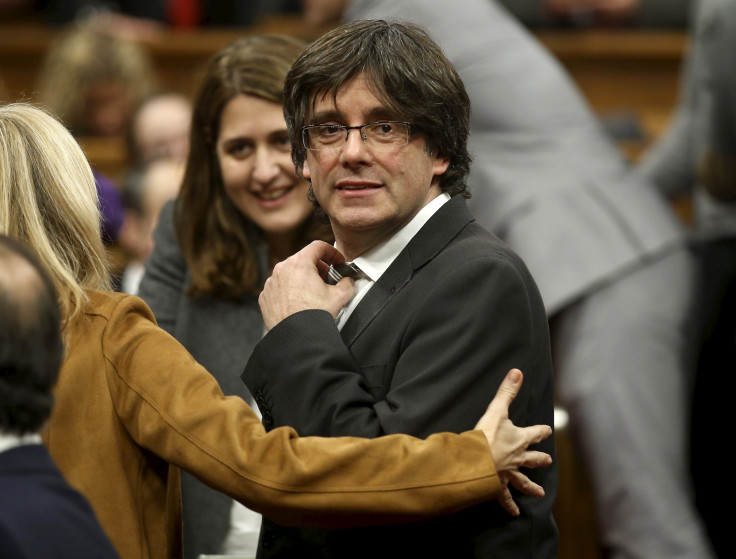Catalan Independence Back On Track As New Leader Sworn In

Catalonia's Parliament swore in a new separatist leader on Sunday evening, putting the pro-independence movement's commitment to break with Spain over the next 18 months back on track after a long political deadlock. The eleventh-hour decision played into a fraught national political scene since an inconclusive election last month in which Spain's ruling People's Party won the most seats but lost its parliamentary majority.
The country has been in stalemate since then.
After months of tense negotiations between Catalan parties over a leader who could unite the pro-independence movement, Carles Puigdemont, mayor of Girona, replaced Artur Mas as head of a majority separatist Catalan Parliament, which will now restart the push for a unilateral split with Spain.
Catalonia's parties had until Monday to agree on a new leader or new regional elections would have had to be called.
Under the separatists' 18-month "roadmap," Catalan authorities will approve their own constitution and begin building institutions necessary for an independent state such as an army, central bank and judicial system.
"We begin an extremely important process, unparalleled in our recent history, to create the Catalonia that we want, to collectively build a new country," Puigdemont told the Catalan Parliament.
He said Catalonia would need to negotiate with the Spanish state, the European Union and the international community to achieve such a goal.
His plan faces fierce opposition from Spain's central government under the People's Party, which refused to allow a referendum in Catalonia in 2014, arguing it would contravene Spain's constitution.
Acting Spanish Prime Minister Mariano Rajoy said on Sunday he would block any unilateral move from the new Catalan government and had instructed all government officials to enforce the law.
"I will defend and preserve democracy all over Spain. I will defend the sovereignty of the Spanish people," he told a news conference.
Rajoy said he had received the backing of Socialist party leader Pedro Sanchez and newcomer centrist party Ciudadanos' leader Albert Rivera, having spoken to both that afternoon.
The resurgence of a unified independence movement increases pressure on Rajoy and his Socialist rivals to bury their differences and form a German-style "grand coalition" in Madrid to thwart the Catalan parties.
A senior PP official said on Sunday a coalition would be the best response to the separatist challenge.
"We should reach an agreement amongst us all to form the broadest government possible of the main parties - the People's Party, the Socialists, and also, logically, Ciudadanos," Fernando Martinez Maillo told a news conference.
Spain's Constitutional Court struck down a resolution for independence by the Catalan regional assembly in November.
Opposition groups also point to polls that show a majority of people in Catalonia, a northeastern region of 7.5 million people with its own distinct language, say they want to remain part of Spain but with greater autonomy on issues such as tax.
'Chase Out the Invaders'
The agreement between Junts pel Si (Together for Yes), a coalition of the center-right CDC party and leftist ERC, and the anti-capitalist minority partner CUP gives the separatist bloc a slim majority in the 135-seat Catalan Parliament.
On top of Junts pel Si's 62 seats, the CUP will add two seats of its own and its other eight delegates agreed to not oppose the government on issues of independence. Two of the eight CUP delegates abstained in the vote for Puigdemont.
CUP had opposed Mas's bid for another term due to deep differences over such issues as an independent Catalonia's membership of NATO and the European Union.
Puigdemont, a conservative mayor of the Catalan city of Girona, is cut from the same cloth as Mas. In a swipe at the central government in Madrid, newspaper El Pais quoted him saying he wants to "chase the invaders out of Catalonia".
Antonio Barroso, an analyst at Teneo Intelligence, said Mas's departure would lead to a radicalization of the pro-independence movement given Puigdemont's attachment to a more separatist strand of the CDC party.
Meanwhile, the national political parties are maneuvering for position, with a variety of coalitions possible. Some analysts also see a new national election as inevitable.
The Socialists' Sanchez, whose party came second in the election, has said he would prefer a coalition of the left. But the situation is complicated by the fact that the left-wing Podemos party has said it supports a referendum on Catalan independence, which the Socialists reject.
(Additional reporting by Robert Hetz and Julien Toyer; Editing by Tom Heneghan)
© Copyright Thomson Reuters 2024. All rights reserved.





















